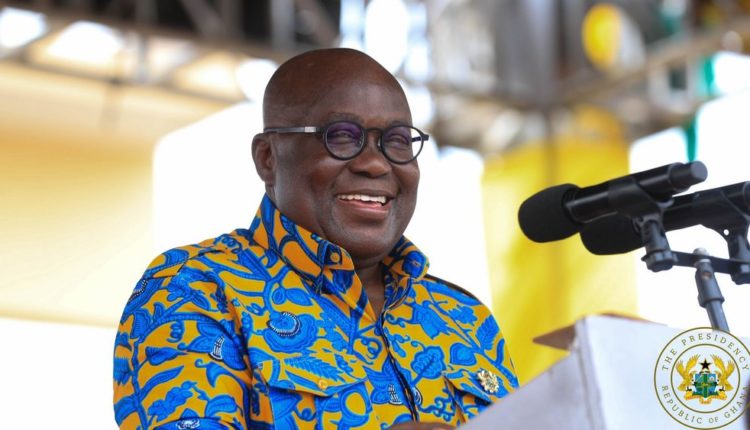GH¢100bn CARES Programme to boost GDP growth by 5 percent – Akufo-Addo
The government is targeting economic growth exceeding the average for Sub-Saharan Africa under the GH¢100 billion Ghana CARES ‘Obaatampa’ Programme.
Even though the Gross Domestic Product (GDP) has been negatively impacted by the COVID-19 pandemic, President Akufo-Addo is confident Ghana will achieve a 5 per cent GDP growth in 2021.
This is above the 3.2% growth projection of the International Monetary Fund (IMF) for Sub-Saharan Africa for 2021.
Government’s forecast also exceeds forecasts of global rating agencies and other Bretton Woods Institutions.
Fitch is projecting a growth of 4.8 per cent while Moody’s is projecting a growth of four per cent.
The World Bank’s projection is pegged at 1.4 per cent while the IMF sees growth by the end of the year.
Presenting the first State of the Nation Address (SoNA) address in his second term of office, President Akufo-Addo highlighted the need to expedite the process of moving Ghana to a situation beyond aid.
“That is why Government has developed and is currently implementing the one hundred-billion-cedi (GH¢100 billion) Ghana CARES ‘Obaatampa’ Programme to transform, revitalise and modernise our economy, and return it to high and sustained growth for the next three years”.
The key projects under the GH¢100 billion CARES Programme include:
- a) supporting commercial farming and attracting educated youth into commercial farming;
- b) building the country’s light manufacturing sector;
- c) developing engineering/machine tools and ICT/digital economy industries;
- d) fast tracking digitalisation;
- e) developing Ghana’s housing & construction industry;
- f) establishing Ghana as a Regional Hub;
- g) reviewing and optimising the implementation of Government flagships and key programmes; and
- h) creating more jobs for young people, and expanding opportunities for persons with disabilities.
The establishment of the National Development Bank, under the Ghana CARES programme, is expected to provide support to businesses in Ghana.
“Government expects economic activity, which has already picked up, to do so even further, following the ongoing vaccination exercise, and the easing of restrictions put in place to curb the effects of the disease,” he said.
“The medium-term outlook supported by the implementation of the Ghana CARES Programme is bright,” he added. “We are confident that, together we will emerge from the COVID-19 pandemic with a stronger and more resilient economy”.
COVID-19 impact on economy
According to the COVID-19 Business Tracker survey, the COVID-19 pandemic has led to a considerable number of job losses.
The COVID-19 Business Tracker showed that about seven hundred and seventy thousand (770,000) workers had their wages reduced, and about forty-two thousand (42,000) employees were laid off during the three-week partial lockdown imposed on the Greater Accra and Greater Kumasi Metropolitan Areas and their contiguous districts, Tema and Kasoa.
Overall economic growth rate for 2020 was revised downwards from 6.8% to 0.9%. The non-oil economy was also revised from 6.7% to 1.6%. Revenue shortfall was estimated at GH¢13.5 billion, with additional expenditures related to stemming the tide of COVID-19 estimated at GH¢11.8 billion, with the combined effect amounting to GH¢25.3 billion, or 6.6% of GDP.
The resultant fiscal deficit for 2020 was, thus, revised from 4.7% of GDP to 11.4% of GDP. This was done to reflect the impact of the pandemic. The fiscal responsibility rule of keeping a deficit within a threshold of 5% of GDP and a positive primary balance for every year was suspended in 2020 to enable fiscal operations accommodate the impact of the pandemic.
Economic interventions
The Bank of Ghana (BoG) lowered the Monetary Policy Rate by one hundred and fifty (150) basis points to 14.5 percent, reduced the Primary Reserve Requirement from ten percent (10%) to eight percent (8%), reduced the Capital Adequacy Requirement from thirteen percent (13%) to eleven-point five percent (11.5%), and reduced interest rates based on the Ghana Reference Rate by two hundred (200) basis points.
The Ghana Revenue Authority has also extended the dates for filing of taxes from four (4) months to six (6) months after the end of the basis year, issued a waiver on VAT, National Health Insurance Levy and GETFund Levy on donations of equipment and goods for fighting the pandemic, waived income taxes on Third-Tier Pension withdrawals, and permitted the deduction of contributions and donations towards COVID-19 as allowable expense for tax purposes.
The Ghana Statistical Service (GSS) Business Tracker survey also showed that nearly 85,000 businesses closed down as a result of the plague.
Many firms were not able to meet their financial obligations such as salaries, operation cost and loan repayment with the Ghana Association of Bankers (GAB), estimating that banks in Ghana lost out on GH₵3 billion loan repayment from customers.
Government, therefore, had to step in with a soft loan of GHC 1billion for small and medium scale enterprises.
The government earmarked about GH₵2 billion guarantee fund for over 100 large-scale firms to access more capital for operations.
Other interventions include:
- a) The formulation and implementation of the COVID-19 preparedness and response plan;
- b) tracing, testing, treatment;
- c) waiver of personal income tax and provision of an additional fifty percent (50%) basic salary allowance to healthcare workers;
- d) expanding the capacities of laboratories to increase COVID-19 testing;
- e) establishment of isolation centres in all regions and districts;
- f) fumigation of markets and schools;
- g) provision of food packages and hot meals for residents in areas affected by the partial lockdown
- h) provision of free water for all households, provision of free electricity for lifeline consumers and a fifty percent (50%) discount for all other consumers;
- i) reduction in the Communication Service Tax (CST) from nine percent (9%) to five percent (5%), the institution of a seven hundred and fifty million cedi (GH¢750 million) loan facility for micro, small and medium enterprises through the CAPBUS Initiative; and
- j) the provision of a two billion cedi (GH¢2 billion) guarantee facility to support large businesses, such as schools and pharmaceutical companies.


